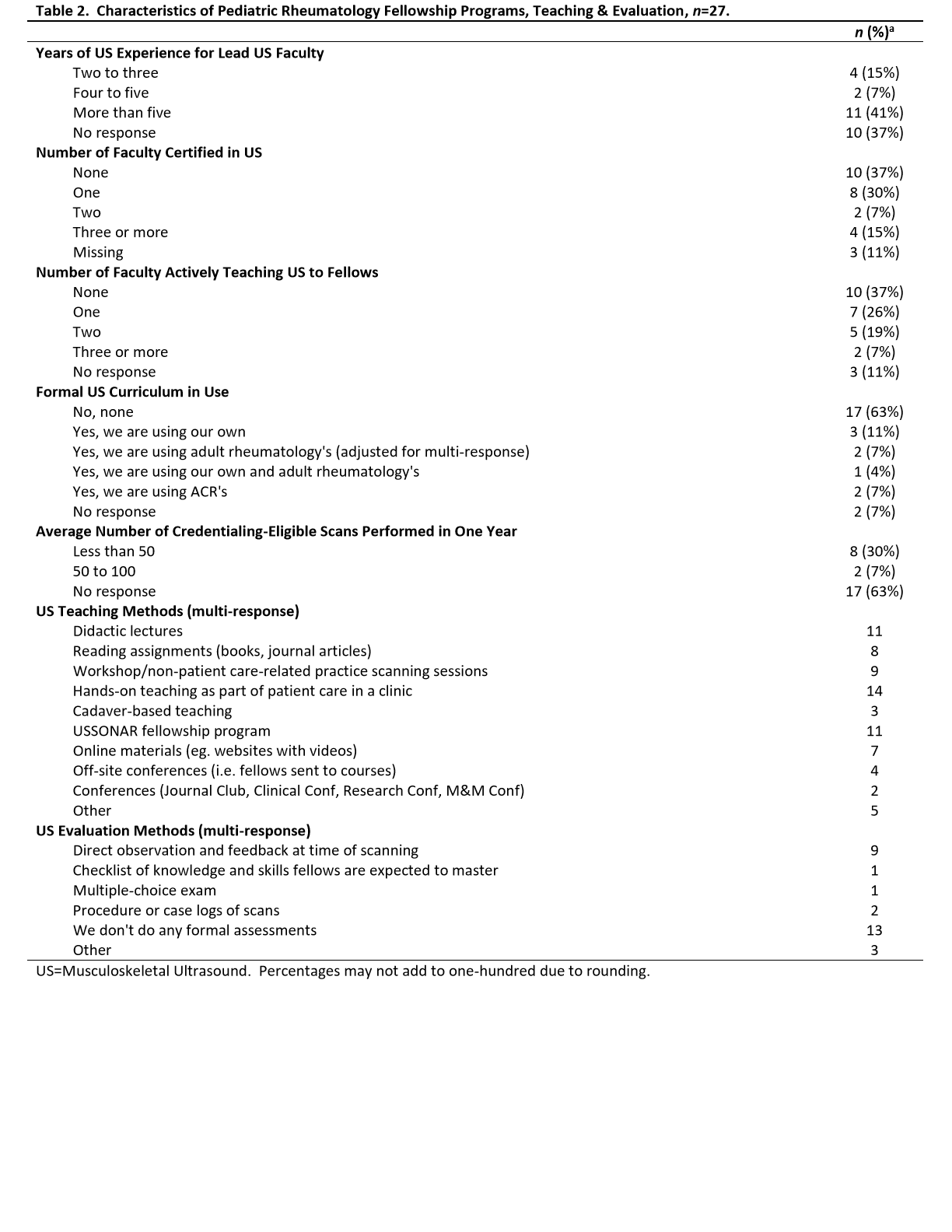Session Information
Session Type: Poster Session C
Session Time: 8:30AM-10:30AM
Background/Purpose: Musculoskeletal ultrasound (MSUS) has value in the evaluation of both pediatric and adult rheumatic diseases. It is taught by at least 94% of adult rheumatology fellowship programs based on a 2017 survey. The objective of the present study is to assess the current teaching of MSUS in Canadian and American pediatric rheumatology fellowship training programs, including surveying the teaching methods being employed.
Methods: A core group of pediatric and adult rheumatologists with at least 5 years of experience in medical education and/or in ultrasound convened to develop a survey that assessed for faculty training in ultrasound, access to equipment, financial support for faculty training and equipment, curricular implementation including educational resources, teaching and assessment of competency in ultrasound. Qualtricsâ was utilized to distribute the survey through email to program directors using an anonymous link, with a follow up email sent in two weeks to non-responders. A list of fellowship programs in the USA (36) and Canada (3) were obtained through the American Medical Association FreidaTM Online Residency Program Database and the Royal College of Physicians and Surgeons’ Canadian Accreditation of Residency Education (CanEra ) website, respectively.
We list the cross-sectional descriptive frequencies and percentages to summarize the data provided by the 27 respondents who completed the survey by May 24, 2021.
Results: We garnered a 69% response rate thus far, with 27 responses. Majority of the survey respondents self-identified as program directors [23 (85%)] (Table 1). 20 (74%) respondents affirmed that their programs offered some level of MSUS training but the majority (17, 63%) surveyed did not have a formal MSUS curriculum. 12 (44%) indicated that they have 1-2 faculty members that actively teach MSUS to fellows. Most programs covered normal and abnormal sonoanatomy, image optimization and knobology, US guided procedures, and documentation and billing as content; and utilized various teaching methods (Table 2). Most programs also did not name any formal assessment methods of proficiency but did cite the use of direct observation and feedback, and use of procedure logs.
The highest ranked barrier identified was “inadequate time or clinic space to perform MSUS in clinic” with 14 votes for it as a minor barrier and 10 votes for it as a major barrier and accounting for 89% of the total respondent ratings (Table 3). “Inadequate number of faculty to teach” [22 (82%)], and “lack of time or clinic space to include MSUS in clinics and didactics” [21 (78%)] were the next highly rated minor or major barriers.
Conclusion: Out of 27 responses, 85% of Canadian and American pediatric rheumatology fellowship programs are teaching MSUS to fellows. Competency assessment methods are needed. Barriers related to curricular integration include needing faculty who can teach and having the time and space to perform MSUS and include MSUS in clinic teaching and didactics. Further faculty development not only to inculcate MSUS skill sets but also to gain MSUS teaching and assessment skill sets and curriculum development are needed.
 Table 1. Characteristics of Pediatric Rheumatology Fellowship Programs, Faculty Descriptors
Table 1. Characteristics of Pediatric Rheumatology Fellowship Programs, Faculty Descriptors
 Table 2. Characteristics of Pediatric Rheumatology Fellowship Programs, Teaching and Evaluation
Table 2. Characteristics of Pediatric Rheumatology Fellowship Programs, Teaching and Evaluation
 Table 3. Perceived Barriers to Complete Curricular Integration in Pediatric Rheumatology Fellowship Programs
Table 3. Perceived Barriers to Complete Curricular Integration in Pediatric Rheumatology Fellowship Programs
To cite this abstract in AMA style:
Lin C, Oberle E, Curran M, Roth J, Vega-Fernandez P, DeRanieri D, Ting T, Benham H, Salto L, Torralba K. Musculoskeletal Ultrasound Instruction in US and Canadian Pediatric Rheumatology Fellowship Programs [abstract]. Arthritis Rheumatol. 2021; 73 (suppl 9). https://acrabstracts.org/abstract/musculoskeletal-ultrasound-instruction-in-us-and-canadian-pediatric-rheumatology-fellowship-programs/. Accessed .« Back to ACR Convergence 2021
ACR Meeting Abstracts - https://acrabstracts.org/abstract/musculoskeletal-ultrasound-instruction-in-us-and-canadian-pediatric-rheumatology-fellowship-programs/
